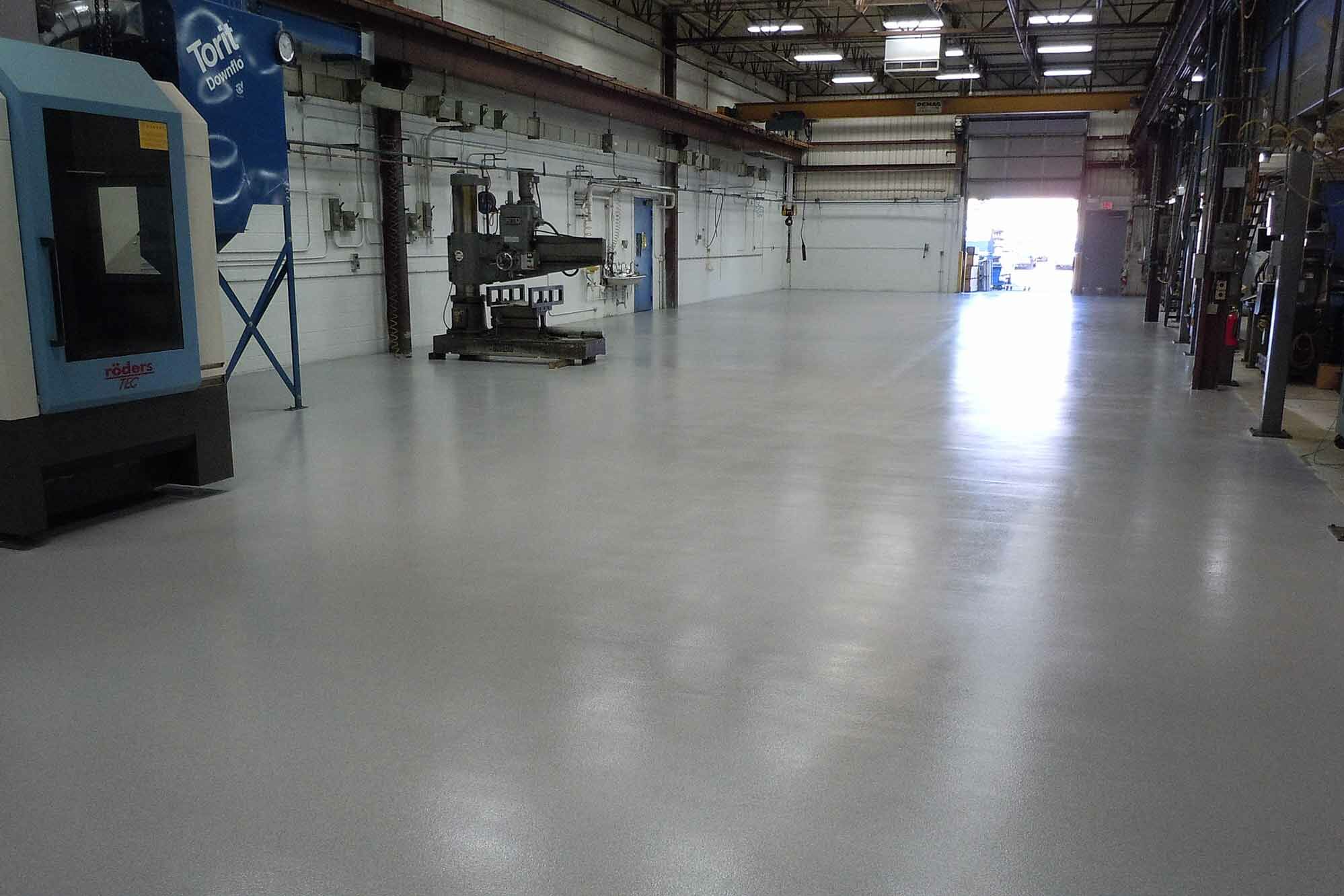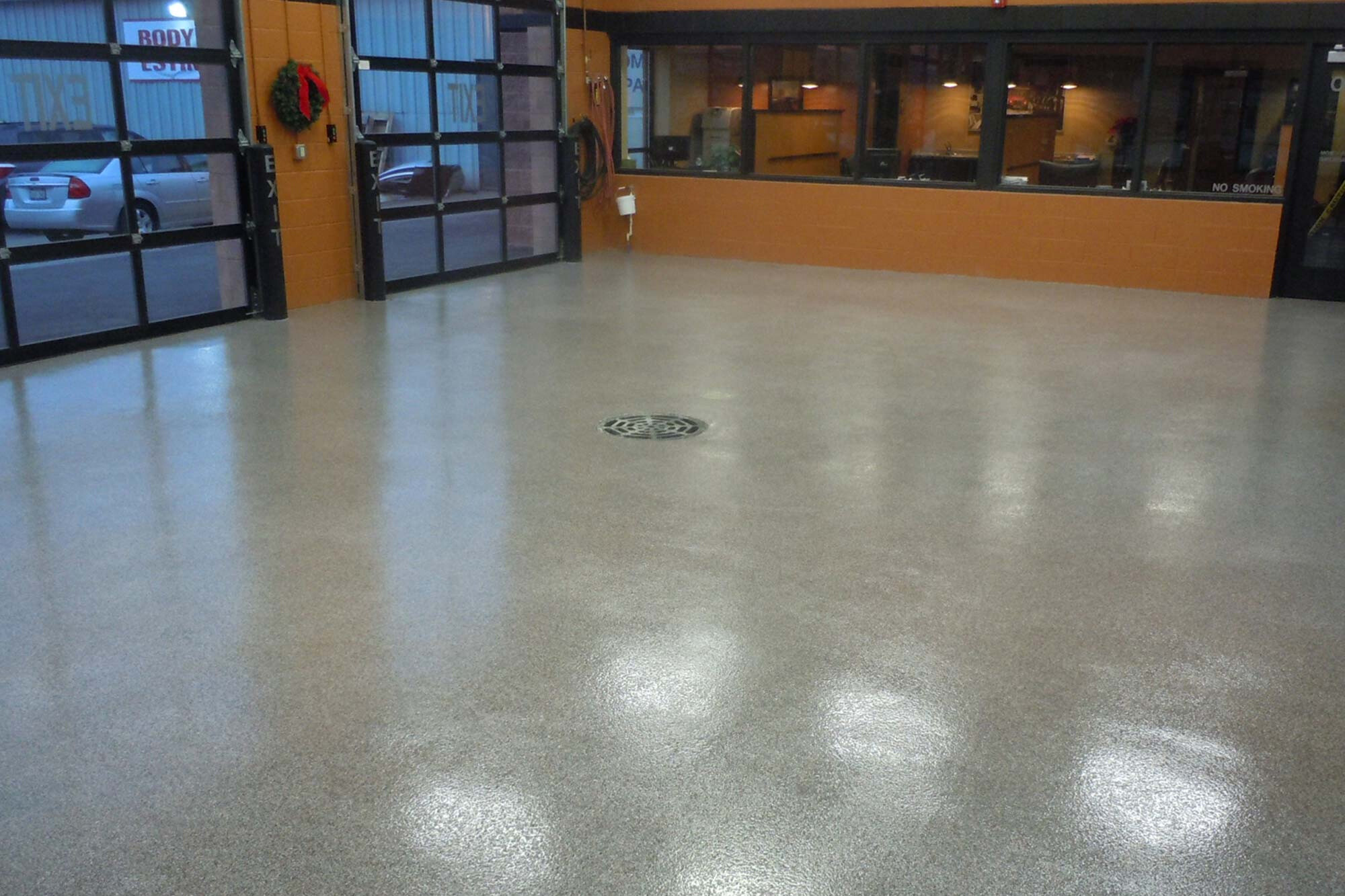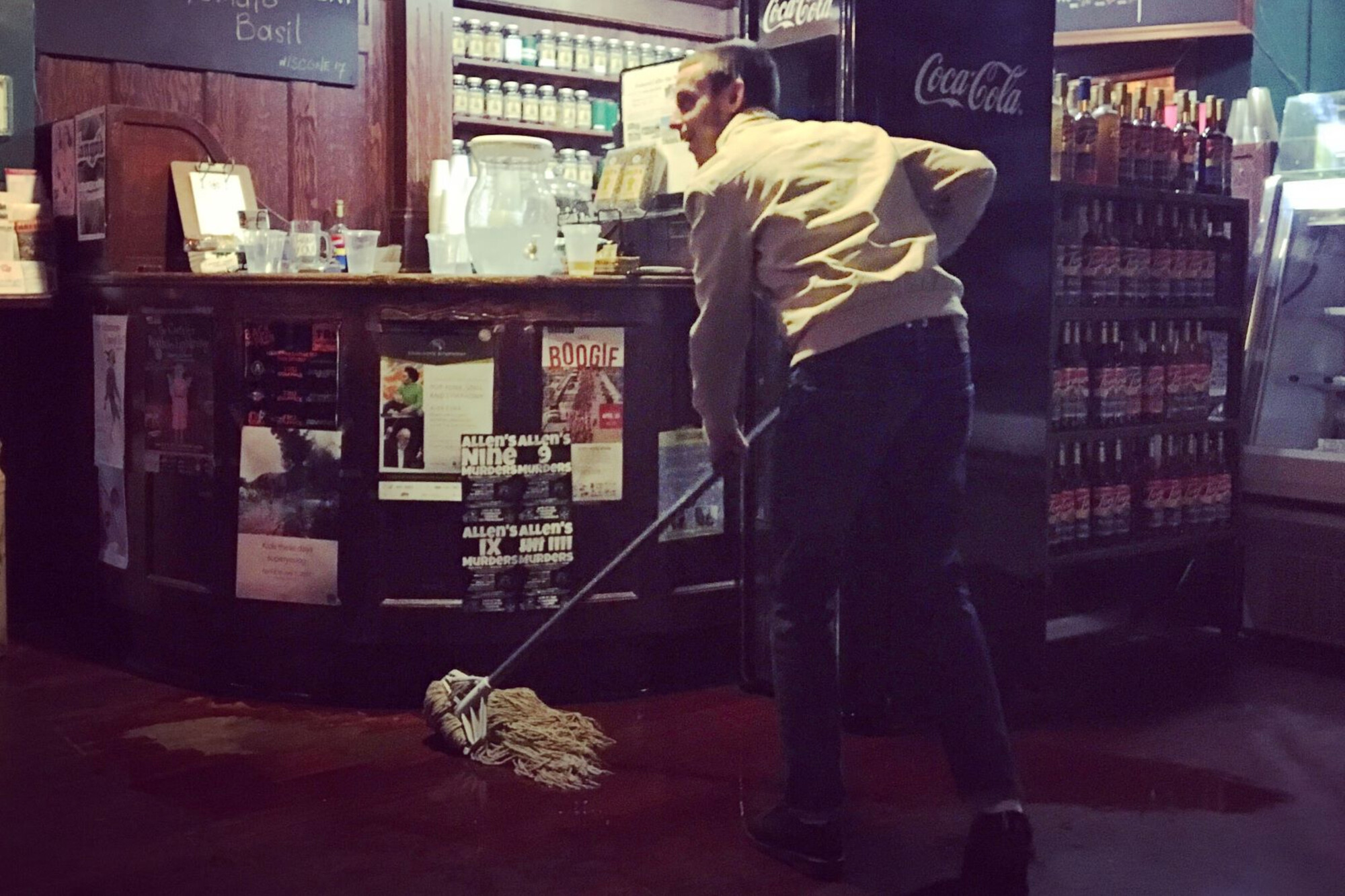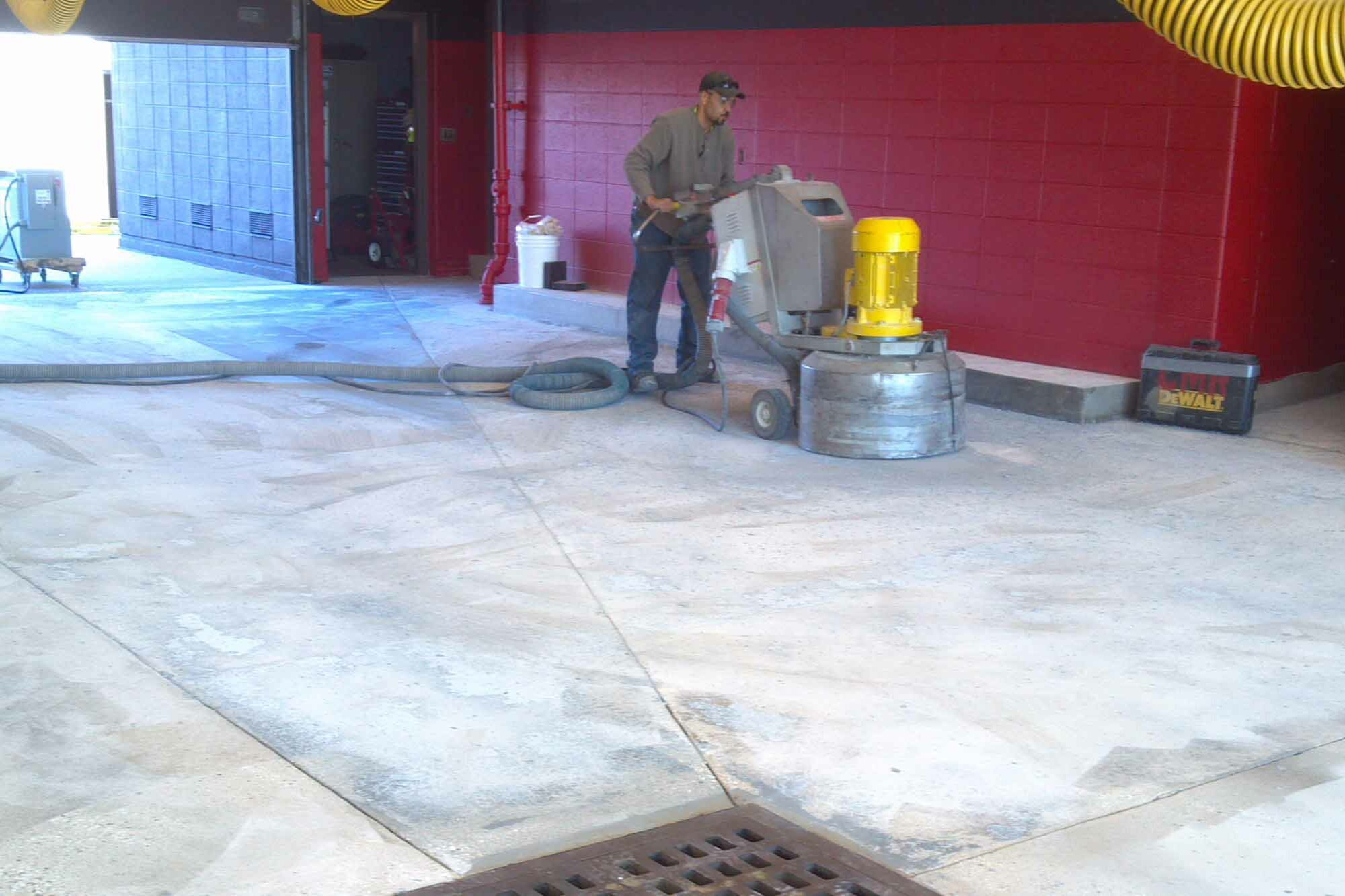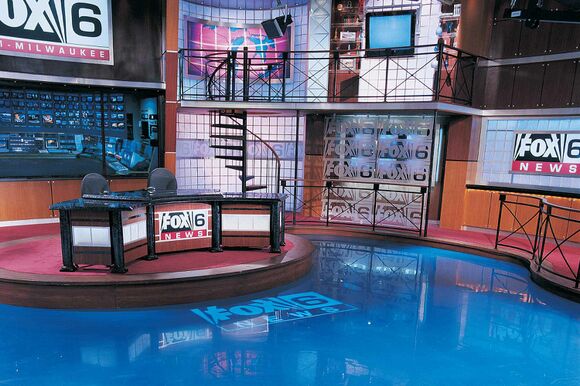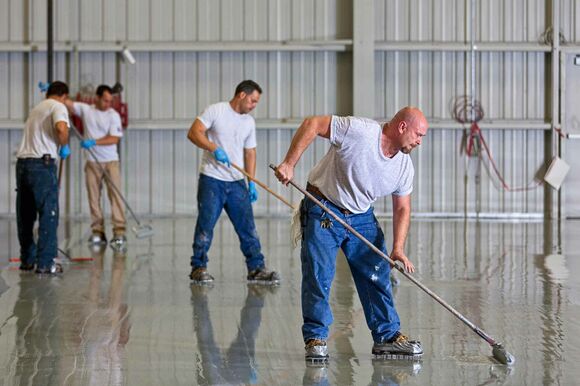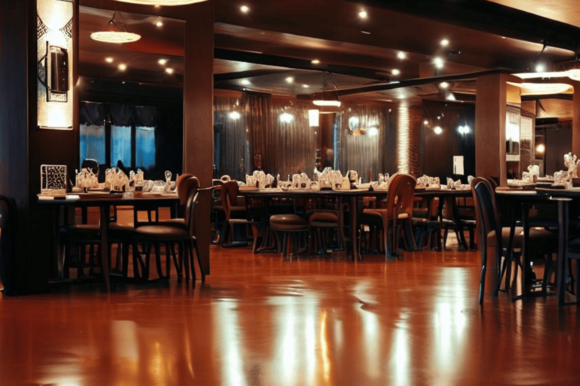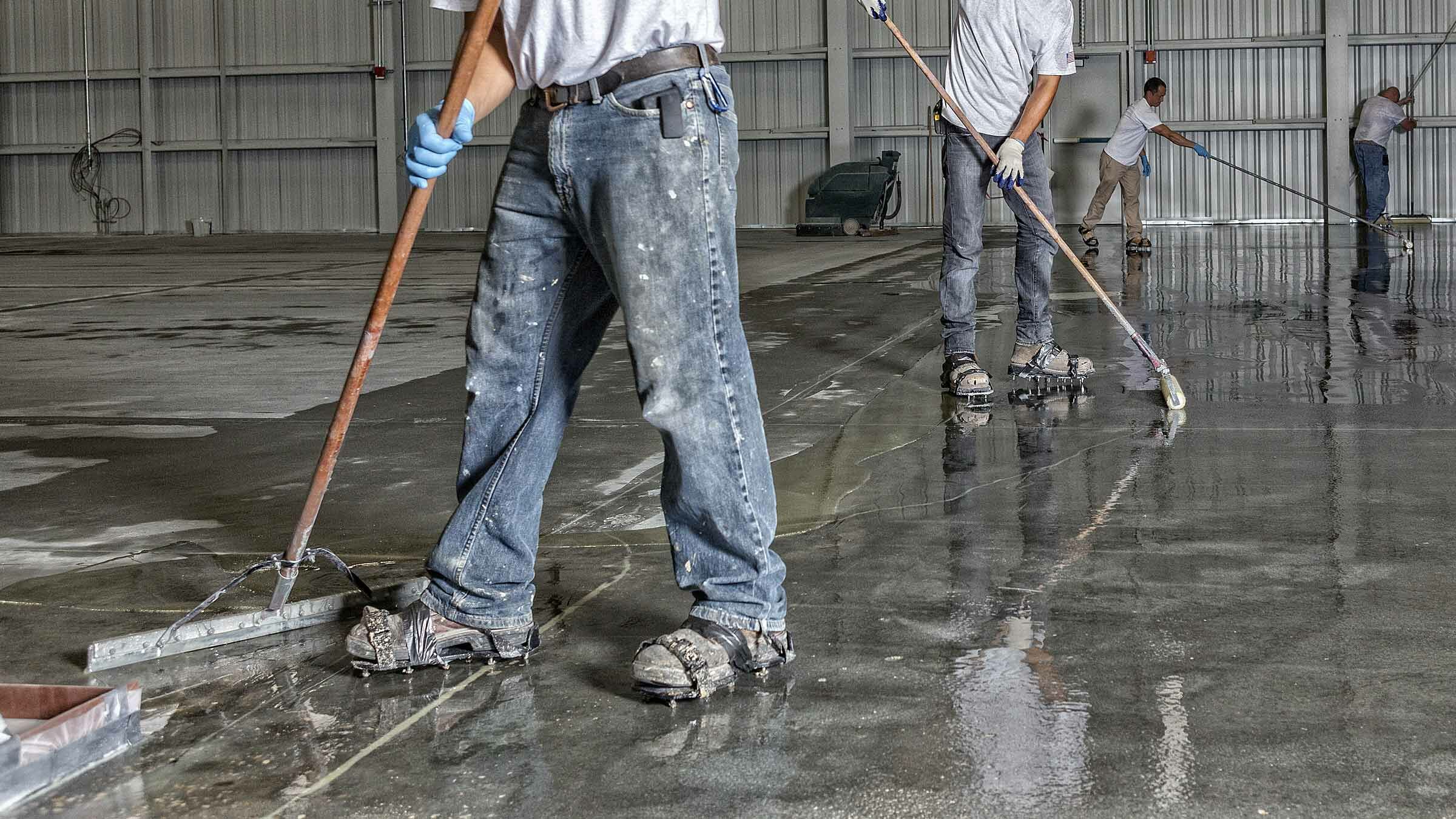Learn Everything You Need to Know about Choosing, Installing, and Maintaining Epoxy Flooring for Your Business
Commercial facilities such as hotels, restaurants, and stadiums require hard-wearing, durable, resilient flooring solutions. While options like polished concrete and urethane cement flooring provide these must-haves, epoxy flooring is also a fitting choice. In actuality, the benefits of epoxy flooring for commercial use outweigh the competing flooring options when comparing chemical and stain resistance, safety, and more.
Our Epoxy Flooring Guide for Commercial Applications tells you everything you need to know about choosing, installing, and maintaining epoxy flooring for your business.
Epoxy Flooring Guide Part One: The Basics
What are Commercial Facilities?
We’re starting our epoxy flooring guide with the basics as some may think a commercial building may be industrial or even institutional. Commercial facilities include, but are not limited to:
- Commercial kitchens Restaurants
- Hallways Walkways
- Lobbies Corporate Offices
- Greenhouses Hotels
- Stadiums Retail Stores
- Showrooms Galleries
- Locker Rooms Museums
What is Epoxy?
Epoxy consists of a two-part chemical and liquid resin. These parts combine and cause a reaction with each other that forms a solid plastic covering. When this resin covering gets applied to a concrete floor, it acts as a tough protective coating. These resins create an extreme performance surface. When mixed with aggregates like vinyl chips or colorful quartz pieces, epoxy generates a decorative appearance. And, when combined with polymer grits, it forges a safe, anti-slip texture.
In addition to acting as a concrete floor covering, epoxy is used in various other building and construction applications. These thermoset plastics have a multitude of uses in manufacturing. They serve as:
Adhesives
Known as structural or engineering adhesives, this epoxy commonly makes wood laminates for decks and roofs; however, it also adheres to stone, glass, metal, and certain plastics. They are more temperature/heat and chemical resistant than most other adhesive compounds.
Primers and Paints
Water-based epoxy paints dry faster and adhere to surfaces better than other paint. They protect and provide a stain-resistant aesthetic to the walls beneath.
Sealants
While epoxy floor coatings rank high on the list of sealant uses, epoxy can be used for several sealing options. Most recently, its popularity spread through the countertop business. Innovative technology developed sustainable, durable countertops created using only recycled material combined with epoxy making it a desired commodity for kitchen remodeling.
Plastics
The anti-corrosive properties of epoxy combined with its lightweight make it an optimal component of electronic devices, construction products, and airplanes.
What are the Advantages of Epoxy in Flooring?
Epoxy floors are a sought-after option for flooring, especially commercial flooring, because of their added safety, chemical resistance, and unmatched durability.
The anti-skid/anti-slip properties make commercial work environments safer by reducing the risk of workplace accidents caused by slippery floors. Their chemical and stain-resistant properties add to their safety aspect and prolong the life of the concrete flooring beneath the surface. By preventing harsh chemicals, acids, oils, and water from penetrating the naturally porous concrete substrate, epoxy reduces the likelihood of corrosion and mold. When spills occur, minimal cleanup is required. Most can simply be wiped up with a towel.
Epoxy Flooring Guide Part Two: The Benefits
Why are Epoxy Floors Beneficial in Commercial Settings?
Waterproof
Epoxy floors resist the growth of mold, mildew, and other harmful bacteria, making them optimal for use in places that require a sterile environment. Commercial settings like hospitals and commercial-grade kitchens necessitate thorough sanitization daily, sometimes multiple times throughout the day. With each use of cleaning solutions and water, flooring becomes more susceptible to dampness, leading to the growth of damaging bacteria and fungi. As stated earlier in our epoxy flooring guide, epoxy floor coverings create a water-tight bond, sealing the concrete below and preventing moisture penetration.
Chemical and Spill-Resistant
This same bond and seal that creates a waterproof seal also transforms standard cement flooring into a chemical and spill-resistant surface. The epoxy coating turns porous concrete into a nonporous floor, meaning liquids of any kind are repelled and cannot seep inside. This makes the flooring solution perfect for withstanding the commercial abuse flooring takes daily.
Consider a commercial kitchen. Think of the number of times in a day the floor is exposed to water or spills. From grease and oils spilled during food preparation, water being sprayed to wash dishes, cleaning products used on the floor to keep up with sanitation regulations, and the pressure washer exposure to remove those cleaning products all contribute to the potential damage to an untreated concrete floor. However, once an epoxy coating is applied, all is repelled, and damage is avoided.
Increased Workplace Safety
Epoxy floors have non-slip and skid-resistant properties, increasing the safety of your employees and customers alike. Whether you’re concerned about slips and falls from areas with a lot of water and chemical exposure, like our epoxy flooring guide mentioned above, or you have a high vehicle traffic area like a warehouse, epoxy floor coverings are the best solution for you. Epoxy flooring for commercial use comes in an infinite variety of finishes and textures, all of which should be tailored to your specific industry and need.
Easy to Clean and Maintain
The resinous coating created by applying epoxy to a concrete floor repels dirt, debris, and dust, making them exceptionally easy to clean and maintain. Leading flooring experts suggest simple daily maintenance, including dust mopping the floor and spot cleaning with water or a non-abrasive cleaning solution. For regular deep cleaning, commercial epoxy floors need wet mopping with a mild detergent combined with water. This combination is to remove any dirt or debris missed by the dry mop.
According to the Creative Maintenance Solutions professionals that created this epoxy flooring guide, this should be done once every few months, more often in extremely high-traffic areas. The reason epoxy floors require such little cleaning and maintenance care is due to their ability to repel dirt and abrasives because of their seamless, tight seal. This dust-proof property makes it a hypo-allergenic product, meaning it’s also safer for those employees and visitors that suffer from allergies.
Longevity and Durability
Known for its durability, epoxy flooring protects concrete floors from all forms of impact. Whether your business requires driving vehicles or forklifts, withstanding the weight of heavy machinery, or transferring heavy equipment back and forth, no damage to the floor will occur. Applying an epoxy floor coating to a concrete surface ensures a reduction in damage to your equipment as well. Because of its smooth finish and optional additives like a vinyl flake or mild aggregate, traction increases, leaving little room for accidental impairments or deterioration risks.
This added protection directly contributes to the longevity of the epoxy flooring’s lifespan. Flooring experts agree that, with proper upkeep, epoxy flooring can last for up to twenty years when installed by a professional concrete flooring company like Creative Maintenance Solutions.
Epoxy Flooring Guide Part Three: The Application and Curing Process
The superior durability and extended longevity of epoxy coatings have more to do with the preparation and application than the product itself. When applying an epoxy finish to your commercial floors, the process should never be hurried. Many factors go into the process even before the epoxy mixing begins.
First and foremost, concrete flooring professionals need to consider the temperature. If it’s too warm, epoxy may bubble and peel after curing. If it’s too cold, the pot time changes. Pot time refers to the time the epoxy mixture takes to react. In warmer temperatures, you have less time to work with the product. Colder temperatures allow you to have a bit more time to complete the application process. Another contributing weather factor is humidity. Generally, when the temperature is colder, the dew point level leans more toward room temperature. This causes relative humidity, which can cause moisture to settle on the uncured product when applying an epoxy finish. Added moisture contributes to blushing, reduced gloss, and defects on the surface of the floor.
Another weather-related factor is leveling. When it’s too cold, the epoxy mixture doesn’t properly settle, causing uneven leveling. This uneven leveling is because the stickiness and thickness of the mixed compound don’t flow how they should, leaving you with nail or trowel marks on the surface of your concrete.
Concrete Surface Prep is Required Prior to Applying Epoxy
While the weather is a contributing factor, the most critical step in the application process occurs before any epoxy is even applied. Correct surface preparation determines the outcome of the finished product. To flawlessly prepare a concrete surface for an epoxy floor coating, installers first inspect the concrete to ensure the coating will adhere. Any paint or previous sealant needs to be removed by grinding or shot blasting.
Once any existing coating has been removed, a moisture test should be conducted on the concrete. Concrete professionals start this by checking for visible signs of moisture. They look for damp areas on the concrete as well as any efflorescence. Efflorescence is a white powdery material that forms on the surface of the concrete. It’s caused by moisture from beneath the surface rising to the top. Along the way, the moisture picks up lime or other minerals found in the concrete. Once the dampness evaporates, the lime and mineral deposits remain. Sometimes the efflorescence forms due to concrete sweating, which usually happens when high humidity causes concrete to collect moisture on the surface.
The next step in concrete surface preparation involves cleaning and repairing the concrete. All dirt, oil, and grease need to be removed from the floor. Cracks should be filled, especially if you want a seamless surface after application.
After a professional epoxy flooring installer considers these factors, they take time to make sure the epoxy compound is properly mixed. Because you’re working with two chemicals, the installer must understand how the properties of these chemicals work separately and when combined. Remember, once the mixing begins, there is a small window of time before the coating starts to harden. The application must start at the right time.
About Creative Maintenance Solutions
Creative Maintenance Solutions uses the most innovative products and applications combined with time-tested measures and the industry’s most knowledgeable flooring professionals to deliver the highest quality epoxy floors. We specialize in epoxy floor coatings for commercial applications in numerous industries, including corporate offices, commercial kitchens, restaurants, schools, and stadiums. Since 1989, our outstanding reputation has spoken for itself. We couldn’t be happier to serve you with the best quality epoxy flooring solutions and excellent customer service.
Contact us today to find out more about our epoxy flooring guide, solutions to your commercial flooring needs, or questions you have about alternative concrete flooring options. Laying the foundation for a clean, safe, and attractive work environment starts with a company you can trust.
Contact Creative Maintenance Solutions to start your epoxy flooring project today!
